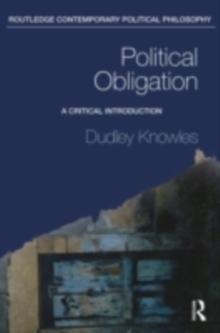
Political Obligation : A Critical Introduction EPUB
by Dudley Knowles
Part of the Routledge Contemporary Political Philosophy series
EPUB
Description
Political obligation is concerned with the clash between the individual’s claim to self-governance and the right of the state to claim obedience.
It is a central and ancient problem in political philosophy.
In this authoritative introduction, Dudley Knowles frames the problem of obligation in terms of the duties citizens have to the state and each other.
Drawing on a wide range of key works in political philosophy, from Thomas Hobbes, John Locke, David Hume and G.
W. F. Hegel to John Rawls, A. John Simmons, Joseph Raz and Ronald Dworkin, Political Obligation: A Critical Introduction is an ideal starting point for those coming to the topic for the first time, as well as being an original and distinctive contribution to the literature. Knowles distinguishes the philosophical problem of obligation - which types of argument may successfully ground the legitimacy of the state and the duties of citizens - from the political problem of obligation - whether successful arguments apply to the actual citizens of particular states. Against the anarchist and modern skeptics, Knowles claims that a plurality of arguments promise success when carefully formulated and defended, and discusses in turn ancient and modern theories of social contract and consent, fairness and gratitude, utilitarianism, justice and a Samaritan duty of care for others.
Against modern communitarians, he defends a distinctive liberalism: ‘the state proposes, the citizen disposes’.
Information
-
Download - Immediately Available
- Format:EPUB
- Pages:232 pages
- Publisher:Taylor & Francis Ltd
- Publication Date:10/09/2009
- Category:
- ISBN:9781135278120
Other Formats
- Paperback / softback from £37.75
- Hardback from £135.00
- PDF from £33.29
Information
-
Download - Immediately Available
- Format:EPUB
- Pages:232 pages
- Publisher:Taylor & Francis Ltd
- Publication Date:10/09/2009
- Category:
- ISBN:9781135278120










